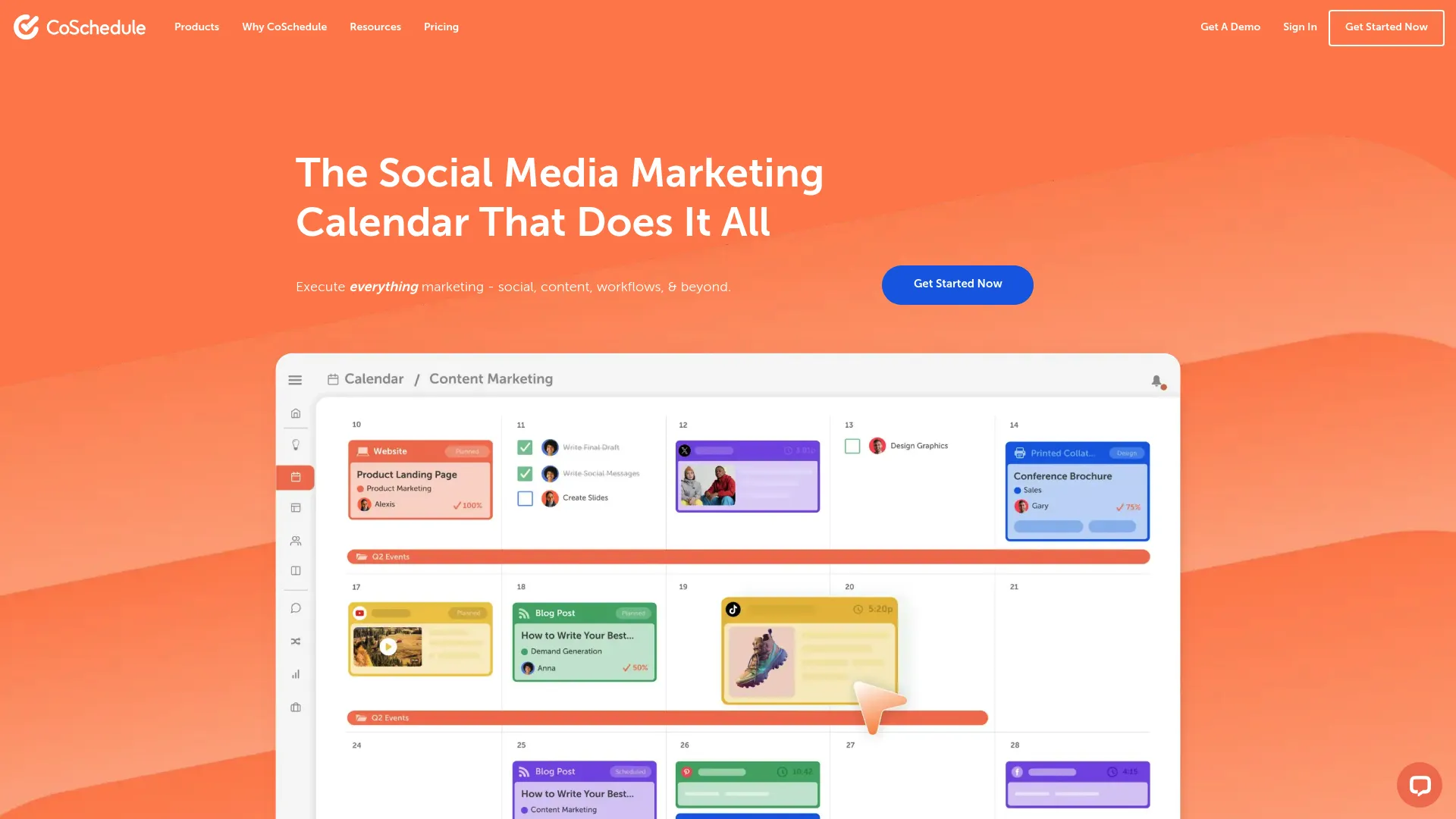I’ll be honest – I was skeptical when I first heard about CoSchedule. Another marketing tool promising to “revolutionize” my workflow? Yeah, right. But after actually using it for the past six months (and getting my team hooked on it), I get why people won’t shut up about this thing. Here’s everything I learned about CoSchedule’s features, pricing, and real-world performance to help you decide if it’s worth your hard-earned marketing budget.
Table of Contents
-
TL;DR: Key Takeaways
-
Criteria Table
-
CoSchedule
-
Alternatives to CoSchedule
-
FAQ
-
Final Thoughts
TL;DR: Key Takeaways
CoSchedule is basically the Swiss Army knife of marketing calendars, and that WordPress integration is stupid good. The ReQueue feature and social templates will save you hours of repetitive work – trust me, I timed it.
But let’s talk about that pricing jump. Going from $39 to nearly $200 is like jumping from a Honda Civic to a BMW with no middle option. Growing businesses get stuck in an awkward spot where they need more features but don’t have enterprise budgets.
Pretty much everyone I talked to mentioned the intuitive interface and actually helpful educational resources. This works best if you’re drowning in content creation and need everything in one place, not if you just want basic social scheduling.
Criteria Table
|
Criteria |
Rating |
Notes |
|---|---|---|
|
Content Management Capabilities |
4.5/5 |
WordPress integration is next-level, visual calendar planning just works |
|
Social Media Integration |
4/5 |
ReQueue is brilliant, multi-platform posting is reliable |
|
Team Collaboration Features |
4/5 |
Task management works well, permissions make sense, could use more customization |
|
Pricing Structure |
3/5 |
Features justify the cost, but that pricing gap is brutal for growing businesses |
|
Ease of Use |
4.5/5 |
Calendar approach makes sense, onboarding actually helps |
|
Analytics and Reporting |
4/5 |
More useful than typical social metrics, some minor display quirks |
|
Scalability |
4/5 |
Works for solopreneurs to enterprises, pricing creates awkward growth stages |
CoSchedule
What CoSchedule Is Best Known For
Look, I’ve tried a lot of marketing tools over the years, and most of them promise the moon but deliver… well, let’s just say disappointment. CoSchedule is different, though. They’ve basically become the go-to name when marketers are complaining about their chaotic content workflows.
Here’s the thing – this isn’t just another social media scheduler trying to be everything to everyone. CoSchedule figured out early on that content marketers were drowning in spreadsheets and sticky notes (guilty as charged), so they built their entire platform around this visual calendar that actually makes sense.
What really sets them apart is how they treat blog content. While everyone else treats your blog posts like an afterthought, CoSchedule puts them front and center. If you’re running a content-heavy business or managing multiple clients, this approach just clicks. Trust me, I’ve seen grown marketers get emotional about finally having everything in one place.
Screenshot of coschedule.com
Features
Okay, let’s dig into what this thing actually does. Fair warning – there’s a lot here, but stick with me.
The Marketing Calendar is where the magic happens. You can literally drag and drop your content around like you’re playing Tetris with blog posts. Sounds simple, but when you can see your entire month at a glance and spot those awkward content gaps before they bite you in the ass, it’s a game-changer. No more “oh crap, we have nothing scheduled for next week” moments.
WordPress integration – and I cannot stress this enough – is ridiculously good. I’m talking write-your-post-optimize-it-and-schedule-social-all-without-leaving-the-platform good. It pulls in your categories, your tags, everything. It’s like they actually talked to WordPress users before building this thing (revolutionary concept, I know).
ReQueue is probably my favorite feature, even though the name makes me cringe a little. Basically, it’s your lazy marketer’s best friend. Got some evergreen content that performed well six months ago? ReQueue will automatically reshare it when your calendar has gaps. It’s like having an assistant who actually remembers to do the boring stuff.
Social Templates save you from staring at that blank “create post” screen. Publish a blog post, and boom – CoSchedule spits out multiple social media versions with different angles and CTAs. You’re not starting from scratch every single time, which is honestly a blessing when you’re managing multiple posts a week.
The Asset Organizer is one of those features you don’t think you need until you have it. All your images, graphics, brand stuff – it’s all searchable in one place. No more digging through email chains asking “where’s that logo file again?”
Best Time Scheduling uses actual data from your accounts instead of those generic “post at 2 PM on Tuesday” articles that never seem to work for anyone. It learns when your audience is actually online and schedules accordingly.
The CoSchedule calendar becomes the nerve center of your entire marketing operation, connecting every piece of your content strategy in one visual interface that doesn’t make you want to pull your hair out.
Pros
Everything in One Place
This is the big one. Instead of juggling WordPress, Hootsuite, Google Sheets, and whatever else you’ve cobbled together, you’re doing everything from one dashboard. The mental relief alone is worth it.
WordPress Integration That Actually Works
I’ve used plugins that claim to integrate with other platforms. Most are garbage. CoSchedule’s feels like it was built into WordPress from the start. Write, optimize, publish, promote – all without switching tabs like a maniac.
Smart Automation That Saves Your Sanity
ReQueue and social templates eliminate so much busy work. I used to spend hours creating social posts for each blog article. Now it takes minutes, and the posts are actually better because I’m not burned out from repetitive tasks.
Team Features That Don’t Suck
If you’re working with a team, the collaboration stuff is solid. Task assignments, permissions, shared assets – it all works without being overly complicated. Your team can actually use it without a PhD in software.
Analytics That Tell a Story
The reporting goes deeper than “here’s how many likes you got.” You can see which content types work, when your audience is engaged, and how your campaigns perform across channels. Useful stuff, not vanity metrics.
Cons
Limited Flexibility
CoSchedule has opinions about how marketing should work, and if your workflow is weird (like mine sometimes is), you’re stuck with their way of doing things. The templates are great until you need something they didn’t think of.
Pricing Cliff
Here’s where things get painful. You’ll outgrow the $39 plan pretty quickly, but the jump to nearly $200 is brutal. There’s no middle ground, which sucks if you’re a growing business that needs more features but doesn’t have enterprise budgets.
Overkill for Simple Needs
If you just want to schedule some Instagram posts, CoSchedule is like using a Ferrari to go to the grocery store. It’ll work, but you’re paying for a lot of stuff you’ll never use.
Occasional Technical Hiccups
Nothing major, but sometimes the dashboard gets wonky or there are sync delays with social platforms. Not deal-breakers, but annoying when you’re in the zone.
Criteria Evaluation
Content Management Capabilities: 4.5/5
This is where CoSchedule shines. The visual planning, WordPress integration, and content organization features are top-notch. If you’re creating regular content, this is probably the best system out there.
Social Media Integration: 4/5
Connects with all the platforms you actually use, and the automation features work reliably. ReQueue alone makes this worth it, though I wish they had better Instagram Stories support.
Team Collaboration Features: 4/5
Works well for most team setups. Task management is solid, permissions make sense, and the shared asset library keeps everyone on brand. Would love more customization options, but it covers the basics really well.
Pricing Structure: 3/5
The features justify the cost if you use them, but that pricing gap is a real problem. Great value at either end, but growing businesses get stuck in no-man’s land.
Ease of Use: 4.5/5
The calendar approach just makes sense, and their onboarding is actually helpful. My team was productive within a week, which never happens with new tools.
Analytics and Reporting: 4/5
More useful than most social media analytics, with actual insights instead of just pretty charts. Some minor display issues keep it from being perfect.
Scalability: 4/5
Works for solo bloggers and enterprise teams, though that pricing structure creates some awkward growth stages.
Community Reviews and Expert Recommendations
The people who’ve been using CoSchedule for years are basically evangelists. I’m talking “I don’t know how I lived without this” level enthusiasm. These aren’t casual users – they’re content marketers and agency folks who’ve tried everything else.
The WordPress community especially loves this tool. Makes sense – if you’re publishing regular blog content, the integration is a game-changer. I’ve seen multiple people mention switching from 3-4 different tools to just CoSchedule and immediately feeling more organized.
But here’s the real talk – the pricing complaints are legitimate. I’ve read dozens of reviews from growing businesses that hit the same wall: outgrew the basic plan but can’t justify the enterprise jump. CoSchedule’s response seems to be “you’ll grow into it,” which isn’t super helpful when you need features now but don’t have the budget.
Marketing experts consistently recommend it for content-focused businesses. If you’re doing serious content marketing, CoSchedule shows up on every “best of” list. The comprehensive approach really does set it apart from point solutions.
CoSchedule content marketing capabilities receive special recognition for their depth and integration with broader marketing workflows.
Pricing
Alright, let’s talk money. CoSchedule has two main options, and there’s a Grand Canyon-sized gap between them.
The Marketing Calendar starts at $39/month per user. You get the core scheduling, WordPress integration, and basic analytics. Perfect for small teams or solo creators who want to get organized without breaking the bank.
Then there’s the CoSchedule marketing suite, which requires custom pricing but typically starts around $190/month. This includes all the fancy stuff – ReQueue, advanced analytics, enhanced team features. It’s aimed at agencies and bigger teams with complex needs.
They offer a 14-day free trial that includes most features, so you can actually test the WordPress integration and team tools with your real content. Definitely worth trying before committing.
Where to Find CoSchedule
You can check it out at their official website, which has demos and detailed feature breakdowns. Their onboarding resources are actually useful (shocking, I know), and customer support is responsive when you need help.
When you visit the site, you’ll notice the distinctive CoSchedule logo prominently displayed, reinforcing the brand’s professional identity. For users who need assistance, CoSchedule help resources include comprehensive video tutorials, detailed documentation, and responsive customer support. The CoSchedule help center covers everything from initial setup to advanced feature implementation, ensuring users can actually succeed with the platform instead of leaving them to figure it out themselves.
Alternatives to CoSchedule
Hootsuite
The old reliable of social media management. Better for pure social monitoring and analytics, but it feels clunky compared to CoSchedule’s visual approach. If you’re not doing much content creation, it might work, but the interface feels dated.
Buffer
Clean, simple, affordable. Great if you just need basic scheduling without all the bells and whistles. But if you’re doing serious content marketing, you’ll quickly feel limited. Think of it as CoSchedule’s younger sibling – simpler but less capable.
Sprout Social
Enterprise-focused with strong analytics and team features. Pricing is comparable to CoSchedule’s higher tiers, but it’s purely social-focused. Missing the content creation integration that makes CoSchedule special.
Later
Perfect for visual-first brands, especially Instagram-heavy businesses. More affordable than CoSchedule but very limited for blog content and comprehensive marketing campaigns. Great for what it does, but it doesn’t do much.
FAQ
Is CoSchedule worth the investment for small businesses?
If you’re creating regular content and struggling with organization, probably yes. The time savings from centralized planning often pays for itself. But if you’re just posting occasionally on social media, you might be better off with something simpler and cheaper.
Small businesses often struggle with generating consistent blog content ideas, which makes CoSchedule’s content planning features particularly valuable for maintaining consistent publishing schedules.
How does CoSchedule’s WordPress integration actually work?
It’s basically like having WordPress built into CoSchedule. Write posts, optimize for SEO, schedule publication, create social campaigns – all from one interface. The plugin syncs everything seamlessly. It’s honestly the smoothest integration I’ve used.
Can CoSchedule handle multiple client accounts for agencies?
Absolutely. The higher-tier plans include multi-client management with separate workspaces, team permissions, and client reporting. Agencies love it because they can manage everything from one dashboard while keeping client work separate.
What makes ReQueue different from regular social media scheduling?
Instead of manually scheduling the same evergreen posts over and over, ReQueue automatically fills empty spots in your calendar with your best-performing content. Set it up once, and it keeps your accounts active without constant babysitting. It’s like having that friend who actually remembers to share your old blog posts when you forget.
Does CoSchedule integrate with email marketing platforms?
Yes, it integrates with major email platforms so you can coordinate email campaigns with your content calendar. Everything scheduled from one place, which is the whole point of using CoSchedule.
When comparing social media management tools, it’s worth reviewing our honest assessment of Buffer to understand how CoSchedule stacks up against other popular platforms in the market.
Final Thoughts
Here’s the bottom line: CoSchedule actually delivers on its promises, which is rare in the marketing software world. If you’re creating regular content and tired of juggling multiple tools, it’s probably worth the investment.
The WordPress integration alone justifies the price for content-heavy businesses. I’ve watched teams go from chaotic, stressful workflows to organized, efficient systems after implementing CoSchedule. The time savings and reduced stress are real.
But let’s be honest about the pricing situation. That gap between tiers is a real problem for growing businesses. You’ll likely outgrow the basic plan quickly, but convincing decision-makers to approve a 5x budget increase is tough.
The thing is, having your marketing organized is only half the battle. You still need content that actually works – stuff that ranks in search, generates leads, and converts visitors. CoSchedule will help you stay organized, but it won’t fix fundamental strategy problems.
Understanding which SEO content tools work best can help maximize the effectiveness of your CoSchedule-organized content campaigns.
At The Marketing Agency, we frequently work with clients who have their content calendars perfectly organized using CoSchedule but struggle with the foundational elements that make content successful. Proper keyword research, technical SEO optimization, and conversion-focused strategies often determine whether your organized content efforts actually generate business results.
If you’re investing in CoSchedule to organize your marketing, make sure you’re also investing in the strategic stuff that actually drives results. The platform gives you excellent organization and automation, but success still depends on creating content that resonates with your audience and moves the needle for your business.



